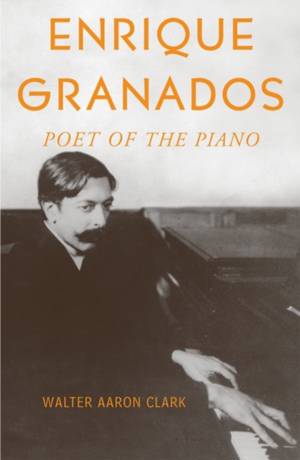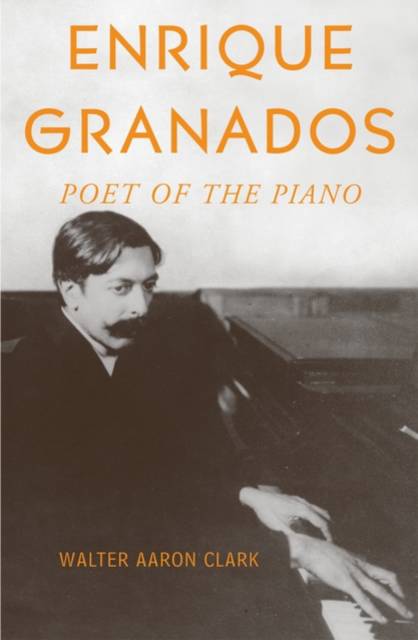
- Retrait gratuit dans votre magasin Club
- 7.000.000 titres dans notre catalogue
- Payer en toute sécurité
- Toujours un magasin près de chez vous
- Retrait gratuit dans votre magasin Club
- 7.000.0000 titres dans notre catalogue
- Payer en toute sécurité
- Toujours un magasin près de chez vous
212,45 €
+ 424 points
Format
Description
Enrique Granados (1867-1916) is one of the most compelling figures of the late-Romantic period in music. During his return voyage to Spain after the premiere of his opera Goyescas at New York's Metropolitan Opera in 1916, a German submarine torpedoed the ship on which he and his wife were sailing, and they perished in the waters of the English Channel. His death was mourned on both sides of the Atlantic as a stunning loss to the music world, for he had died at the pinnacle of his career, and his late works held the promise of greater things to come.
Granados was among the leading pianists of his time, and his eloquence at the keyboard inspired critics to dub him the "poet of the piano." In Enrique Granados: Poet of the Piano, Walter Aaron Clark offers the first substantive study in English of this virtuoso pianist, composer, and music pedagogue. While providing detailed analyses of his major works for voice, piano, and the stage, Clark argues that Granados's art represented a unifying presence on the cultural landscape of Spain during a period of imperial decline, political unrest, and economic transformation. Drawing on newly discovered documents, Clark explores the cultural spheres in which Granados moved, particularly of Castile and Catalonia. Granados's best-known music was inspired by the art of Francisco Goya, especially the Goyescas suite for solo piano that became the basis for the opera. These pieces evoked the colorful and dramatic world that Goya inhabited and depicted in his art. Granados's fascination with Goya's Madrid set him apart from fellow nationalists Albéniz and Falla, who drew their principal inspiration from Andalusia. Though he was resolutely apolitical, Granados's attraction to Castile antagonized some Catalan nationalists, who resented Castilian domination. Yet Granados also made important contributions to Catalan musical theater and was a prominent figure in the modernist movement in Barcelona.
Clark also explores the personal pressures that shaped Granados's music. His passionate affair with a wealthy socialite created domestic tensions, but it was also a source of inspiration for Goyescas. Persistent financial difficulties forced him to devote time to teaching at the expense of composition, though as a result Granados made considerable contributions to piano pedagogy and music education in Barcelona through the music academy he founded there.
While Granados's tragic and early demise casts a pall over his life story, Clark ultimately reveals an artist of remarkable versatility and individuality and sheds new light on his enduring significance.
Granados was among the leading pianists of his time, and his eloquence at the keyboard inspired critics to dub him the "poet of the piano." In Enrique Granados: Poet of the Piano, Walter Aaron Clark offers the first substantive study in English of this virtuoso pianist, composer, and music pedagogue. While providing detailed analyses of his major works for voice, piano, and the stage, Clark argues that Granados's art represented a unifying presence on the cultural landscape of Spain during a period of imperial decline, political unrest, and economic transformation. Drawing on newly discovered documents, Clark explores the cultural spheres in which Granados moved, particularly of Castile and Catalonia. Granados's best-known music was inspired by the art of Francisco Goya, especially the Goyescas suite for solo piano that became the basis for the opera. These pieces evoked the colorful and dramatic world that Goya inhabited and depicted in his art. Granados's fascination with Goya's Madrid set him apart from fellow nationalists Albéniz and Falla, who drew their principal inspiration from Andalusia. Though he was resolutely apolitical, Granados's attraction to Castile antagonized some Catalan nationalists, who resented Castilian domination. Yet Granados also made important contributions to Catalan musical theater and was a prominent figure in the modernist movement in Barcelona.
Clark also explores the personal pressures that shaped Granados's music. His passionate affair with a wealthy socialite created domestic tensions, but it was also a source of inspiration for Goyescas. Persistent financial difficulties forced him to devote time to teaching at the expense of composition, though as a result Granados made considerable contributions to piano pedagogy and music education in Barcelona through the music academy he founded there.
While Granados's tragic and early demise casts a pall over his life story, Clark ultimately reveals an artist of remarkable versatility and individuality and sheds new light on his enduring significance.
Spécifications
Parties prenantes
- Auteur(s) :
- Editeur:
Contenu
- Nombre de pages :
- 304
- Langue:
- Anglais
Caractéristiques
- EAN:
- 9780195140668
- Date de parution :
- 17-11-05
- Format:
- Livre relié
- Format numérique:
- Genaaid
- Dimensions :
- 171 mm x 242 mm
- Poids :
- 553 g

Les avis
Nous publions uniquement les avis qui respectent les conditions requises. Consultez nos conditions pour les avis.






